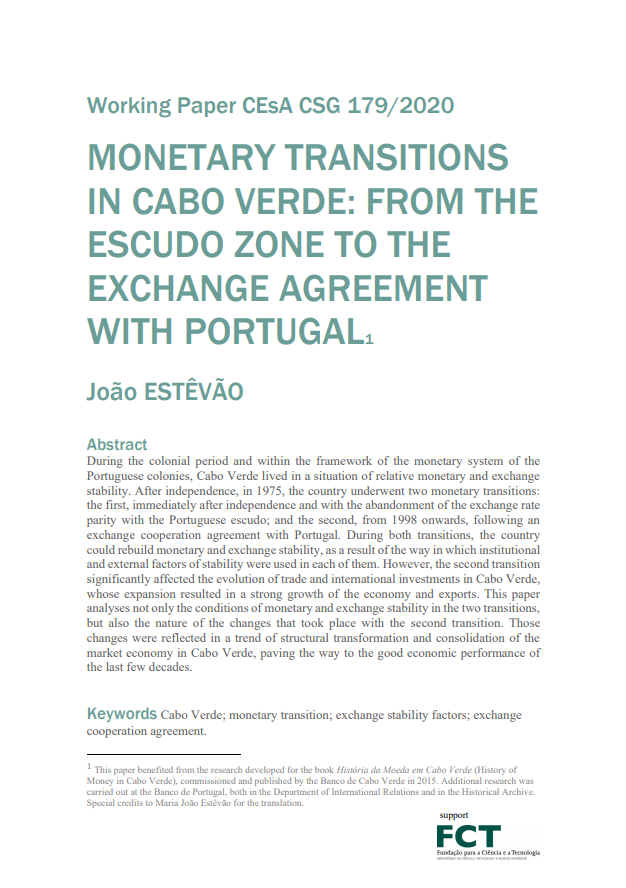Working Paper 179/2020: Monetary Transitions in Cabo Verde: From the escudo zone to the exchange agreement with Portugal

Title: Working Paper 179/2020: Monetary Transitions in Cabo Verde: From the escudo zone to the exchange agreement with Portugal
Author(s): Estêvão, João
Publication Date: 2020
Publisher: ISEG – CEsA/CSG
Quotation: Estêvão, João (2020). "Monetary transitions in Cabo Verde : from the escudo zone to the exchange agreement with Portugal". Instituto Superior de Economia e Gestão – CEsA/ CSG - Documentos de Trabalho nº 179/2020.
Abstract: During the colonial period and within the framework of the monetary system of the Portuguese colonies, Cabo Verde lived in a situation of relative monetary and exchange stability. After independence, in 1975, the country underwent two monetary transitions: the first, immediately after independence and with the abandonment of the exchange rate parity with the Portuguese escudo; and the second, from 1998 onwards, following an exchange cooperation agreement with Portugal. During both transitions, the country could rebuild monetary and exchange stability, as a result of the way in which institutional and external factors of stability were used in each of them. However, the second transition significantly affected the evolution of trade and international investments in Cabo Verde, whose expansion resulted in a strong growth of the economy and exports. This paper analyses not only the conditions of monetary and exchange stability in the two transitions, but also the nature of the changes that took place with the second transition. Those changes were reflected in a trend of structural transformation and consolidation of the market economy in Cabo Verde, paving the way to the good economic performance of the last few decades.
Identifier: http://hdl.handle.net/10400.5/20111
Category: Working paper
Abstract:
Monetary Transitions in Cabo Verde: From the escudo zone to the exchange agreement with Portugal studies how, during the colonial period and within the framework of the monetary system of the Portuguese colonies, Cape Verde lived in a situation of relative monetary and exchange rate stability. After independence in 1975, the country underwent two monetary transitions: the first, immediately after independence and with the abandonment of parity with the Portuguese escudo; and the second, from 1998 onwards, following an exchange rate cooperation agreement with Portugal. During both transitions, the country was able to rebuild monetary and exchange rate stability, depending on how institutional and external stability factors were used in each of them. However, the second transition significantly affected the evolution of international trade and investment in Cape Verde, whose expansion resulted in strong growth in the economy and exports. This article analyses not only the conditions of monetary and exchange rate stability in the two transitions, but also the nature of the changes that occurred with the second transition. These changes translated into a trend of structural transformation and consolidation of the market economy in Cape Verde, paving the way for the good economic performance of recent decades.
Quotation:
Estêvão, João (2020). “Monetary transitions in Cabo Verde : from the escudo zone to the exchange agreement with Portugal”. Instituto Superior de Economia e Gestão – CEsA/ CSG – Documentos de Trabalho nº 179/2020.





